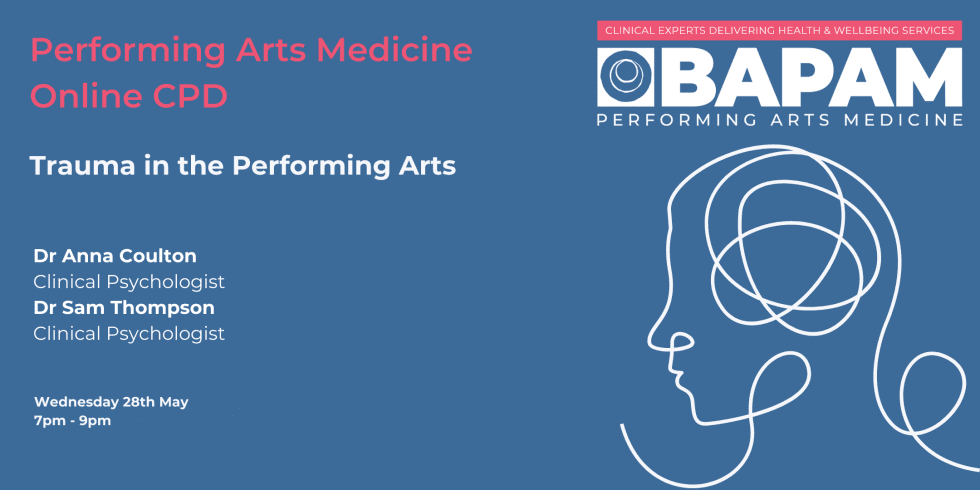We are grateful to performing arts specialist psychotherapeutic counsellor, Janine Ellis, for contributing this guest article which reports on her research into music industry counsellors and psychotherapists’ experiences of working with clients affected by institutional/interpersonal sexism or misogyny.
Janine is a fully qualified integrative psychotherapeutic counsellor providing therapy face-to-face and online to adults and young people over 18 years old. She holds a Masters with Distinction in Integrative Counselling and is a registered member of the British Association of Counselling and Psychotherapy, adhering to their ethical code of conduct. As well as working in private practice, Janine volunteers as a relationship counsellor for Relate Bradford & Leeds and is currently in training as a couples therapist. She is a member of the Music Industry Therapist Collective (MITC) and a registered practitioner for BAPAM. Before training as a psychotherapist, Janine worked in the Music Industry for 20 years.
Janine Ellis MA, MBACP (Reg)
Psychotherapeutic Counsellor
People working in the music industry are three times more likely to suffer from anxiety and depression than the general population – both of which are highest amongst females, who attribute this to the added pressures of being a woman in the industry (Gross and Musgrave, 2016). In January 2024, as part of a Masters research project in Integrative Counselling, a phenomenological study was undertaken that explored the experiences of therapists working in the music industry with clients who had faced issues relating to institutional or interpersonal sexism or misogyny through their work. The study was idiographic and qualitative in its approach and central to it was looking at therapists’ accounts of how sexism or misogyny came about through their clients’ presentations in the therapy room, alongside therapists’ own perspectives on the issues raised and the approaches, techniques and interventions they used to facilitate change for their clients. Semi-structured interviews were conducted over MS Teams with 3 female and 1 male therapist from differing therapeutic modalities, and the transcripts analysed. The study has provided some necessary implications for future counselling practice in the music industry.
The study by Gross and Musgrave titled Can Music Make You Sick? (2016) and the recent parliamentary report into Misogyny in Music (2024) both pointed to a clear need for more culturally aware and individualised therapeutic approaches to women and other non-dominant people in the music industry. Other recent studies (Visser et al., 2022) have explored how the music community is comprised of a distinct group of individuals with unique needs, challenges, and strengths – characteristics that signal a clear need for tailored and affordable access to therapy. These challenges are amplified further as a woman in the industry, especially as a professional musician or when working for smaller companies who have been reported to lack diversity hiring practices (Newman, 2017; Bennett, 2018).
The aims and contributions of this piece of research were therefore as follows:
- To contribute to industry change regarding mental health and issues regarding sexism.
- To improve practice by considering the usefulness of various approaches and interventions with this client group.
- To liberate and empower through the promotion of feminist counselling practices.
- To generate further research into sexism and misogyny in the music industry from multiple perspectives to aid the development of a more detailed and multifaceted account of issues raised.
The Findings
It is salient to acknowledge that all participants conceded to have experiences of working with clients affected by sexism or misogyny in the music industry in different capacities and to varying degrees. These appeared to be institutional or interpersonal experiences that presented overtly though systemic dimensions and/or interpersonally through relationship issues. These presented themselves covertly through other psychological difficulties, some pre-existing and others exacerbated by the pressure of working in the music industry.
| Participant | Age | Gender | Ethnicity | Therapeutic Approach |
| 1 | 55-65 | Female | White European | Integrative |
| 2 | 35-45 | Female | British/Japanese | Person Centred |
| 3 | 55-65 | Male | White British | Integrative |
| 4 | 35-45 | Female | Indian | Integrative |
Table 1 – Participant demographics table
| Theme | Superordinate Theme | Subordinate Theme | Participants contributing to ST |
| 1 | Client’s presenting problems from working in music | Stress, anxiety and depression | All |
| Relationship issues | P1, P2 | ||
| Burnout/Exhaustion | P1, P4 | ||
| Eating disorders | P2, P4 | ||
| Self-harm | P2, P4 | ||
| 2 | Compounding Issues for clients | Childhood issues | All |
| Trauma | All | ||
| Age of client | All | ||
| Lack of safety | All | ||
| Sexual assault and misconduct | P2, P4 | ||
| Racism | P4 | ||
| 3 | Factors linked to therapist approach | Person centred vs. Integrative | All |
| Psychoeducation | All | ||
| Importance of supervision | P2, P3 | ||
| 4 | Therapist perspectives, feelings and attitudes towards issue | Endemic nature | All |
| Anger and sadness | All | ||
| Progress and solutions | All | ||
| Obviousness vs resignation | P1, P2, P3 | ||
| Intersectionality, cultural and gender differences | P1, P3, P4 | ||
| Lived experience of sexism in the music industry | P1, P2 |
Table 2 – Master summary table of themes
Conclusion
The aim of the study was to explore the experiences of music industry therapists working with clients affected by sexism and misogyny looking at how these issues emerge during the therapeutic experience. Furthermore, how this informs the therapeutic approach used. Capturing this process was not easy due to the covert and nuanced nature of issues discussed. Employing a phenomenological approach to examine each participant’s account through a feminist lens also called into question the influence of researcher subjectivity. However, the idiographic approach proved valuable in its ability to capture the voice of each participant, and this was compatible with the feminist approach.
All participants described stress, anxiety and depression as the most common presenting issues for clients. Relationship issues, burnout/exhaustion, eating disorders and self-harm were all reported by half the participants. All participants described their clients as having childhood issues, trauma, a lack of safety in their working environment and the age of the client playing a role in the issues coming up. Sexual assault and misconduct were reported by two participants and racism played a major role in the experiences of participant 4’s clients. The therapeutic approaches were informed by their modalities –integrative, incorporating psychodynamic, creative and intuitive approaches with the person-centred model. Participant 1 spoke highly of acceptance and commitment therapy and moving more towards this approach. P3’s focus was on the relational and dialectical in his integrative approach whilst participant two was solely person-centred. All participants spoke of the importance of psychoeducation with two emphasising the importance of clinical supervision. The negative feelings associated with the pervasive nature of sexism and misogyny in the music industry was apparent throughout. Admittedly, these findings presented a difficulty knowing the specific reasons for clients’ myriads of issues, yet the covert insidiousness of sexism in the music industry was evident throughout. Their shared expression of anger, sadness and a sense of resignation towards the experiences witnessed in their clients was palpable. This was even more pronounced in participant 4’s accounts of difference and how racism and a lack of safety may manifest, especially for her intersectional clients.
More positive notions of progress regarding these issues and around mental health awareness in the industry were also exhibited. The solutions and initiatives discussed point to the findings of Ficek (2023) who suggests in his study that there is too much emphasis on the negative aspects within musicking research and that the literature pays little attention to the positive feelings associated with a career in music. However, returning to the principal study by Gross and Musgrave into music and mental health (2017), music may be therapeutic but a career in music can be traumatic which this study further illustrates. Therefore, the strength of this research lies in its ability to respond to that previous statement attesting to finding it traumatic whilst also giving a voice to those in the industry who have been under-represented in previous studies to date. Crucially, this study explored what is therapeutically significant when working with clients affected by issues relating to sexism and misogyny, suggesting that more trauma informed, feminist interventions are appropriate for this client group.
Recommendations For Practice
Recommendations for counselling practice within the music industry include wider integration of trauma informed interventions and to integrate feminist therapy techniques such as consciousness raising, social and gender-role analysis, resocialization and social activism (Israeli and Santor, 2000). Industry recommendations echo the bold sentiments of Chappell Roan at this year’s Grammy Awards and signal for stakeholders such as artist management companies, booking agencies, promoters and record labels to invest in feminist, trauma informed mental healthcare for employees and artist rosters. This will create a healthier working environment throughout all sectors of the music industry. The findings from this study will be presented at this year’s BACP Conference in May.
References
Bennett, T. (2018) ‘The whole feminist taking-your-clothes-off-thing’: Negotiating the Critique of Gender Inequality in UK Music Industries. The International Association for the Study of Popular Music, 8(1), pp. 1–18.
Ficek, A. (2023) Professional popular musicians’ experiences of pride, insecurity and pressure in their musicking environment, International Journal of Music, Health, and Wellbeing [Online]. Available from: https://storage.googleapis.com/wzukusers/user-20563976/documents/4e084e431fc44ffc969cae7d6e4e9ba3/Adam%20Ficek_FINAL.pdf
Gross, S. A. and Musgrave, G. (2016) Can music make you sick? [Online]. Available from: https://www.musicmindsmatter.org.uk/can-music-make-you-sick
Gross, S. A. and Musgrave, G. (2017) Can music make you sick? [Online]. Available from: https://www.musicmindsmatter.org.uk/can-music-make-you-sick
Israeli, A. L., and Santor, D. A. (2000) Reviewing effective components of feminist therapy. Counselling Psychology Quarterly, 13(3), pp. 233–247.
Newman, M. (2017) #Metoo’s chilling effect, Billboard, 129(29) December, p. 12.
UK Parliament (2024) Misogyny in music [Online]. Available from: <https://publications.parliament.uk/pa/cm5804/cmselect/cmwomeq/129/report.html>
Visser, A., Lee, M., Barringham, T. and Salehi, N. (2022) Out of tune: perceptions of engagement with, and responses to mental health interventions by professional popular musicians – a scoping review, Psychology of Music, 50(3) May, pp. 814-829.
–
Forthcoming BAPAM CPD: Psychological Trauma in the Performing Arts
Our online CPD session on 28 May explores trauma presentations and strategies for supporting clients in the performing arts. BAPAM CPD is suitable for all practitioners working with performing arts clients and patients. Our presenters are expert Clinical Psychologists, Dr Anna Colton, and Dr Sam Thompson, who will cover how trauma is managed within mental health services delivered by BAPAM, as well as the wider context within health provision and the creative sector.


